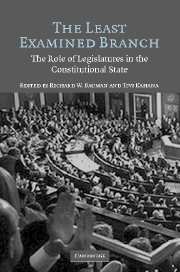Book contents
- Frontmatter
- Contents
- Foreword: Legislatures in the Constitutional State by Amy Gutmann
- Contributors
- New Ways of Looking at Old Institutions
- PART ONE LEGISLATURES AND DEMOCRATIC THEORY
- PART TWO LEGISLATING AND DELIBERATING IN THE DEMOCRATIC LEGISLATURE
- PART THREE CONSTITUTION MAKING BY LEGISLATURES: THE EXPLICIT VERSION
- PART FOUR CONSTITUTION MAKING BY LEGISLATURES: THE IMPLICIT VERSION
- 13 What Do Constitutions Do That Statutes Don't (Legally Speaking)?
- 14 Conditions for Framework Legislation
- 15 Super-Statutes: The New American Constitutionalism
- PART FIVE CONSTITUTIONAL INTERPRETATION AND APPLICATION BY THE LEGISLATURE
- PART SIX IS LEGISLATIVE CONSTITUTIONALISM POSSIBLE?
- PART SEVEN THE LEGISLATURE IN DIALOGUE: DOMESTIC AND INTERNATIONAL CONTEXTS
- Index
13 - What Do Constitutions Do That Statutes Don't (Legally Speaking)?
Published online by Cambridge University Press: 06 August 2009
- Frontmatter
- Contents
- Foreword: Legislatures in the Constitutional State by Amy Gutmann
- Contributors
- New Ways of Looking at Old Institutions
- PART ONE LEGISLATURES AND DEMOCRATIC THEORY
- PART TWO LEGISLATING AND DELIBERATING IN THE DEMOCRATIC LEGISLATURE
- PART THREE CONSTITUTION MAKING BY LEGISLATURES: THE EXPLICIT VERSION
- PART FOUR CONSTITUTION MAKING BY LEGISLATURES: THE IMPLICIT VERSION
- 13 What Do Constitutions Do That Statutes Don't (Legally Speaking)?
- 14 Conditions for Framework Legislation
- 15 Super-Statutes: The New American Constitutionalism
- PART FIVE CONSTITUTIONAL INTERPRETATION AND APPLICATION BY THE LEGISLATURE
- PART SIX IS LEGISLATIVE CONSTITUTIONALISM POSSIBLE?
- PART SEVEN THE LEGISLATURE IN DIALOGUE: DOMESTIC AND INTERNATIONAL CONTEXTS
- Index
Summary
PROLOGUE
“We know that in the relevant sense Britain does not have a written constitution.” So reflects Joseph Raz, hard upon his own observation that Britain's constitution is composed, in part, of “written law.” By written law, Raz means statutes; he mentions, for example, the Bill of Rights of 1689 and the Act of Union (between England and Scotland) of 1706. Other usual suspects in roundups of British constitutional statutes include the Magna Carta and the Act of Settlement of 1701, and of course there is now also the Human Rights Act of 1998. Given the existence of such material along with universal acknowledgment of its substantially constitutive character, some authors quibble with the judgment that Britain lacks a written constitution. “Uncodified,” they say; “piecemeal”; “scattered”; but not unwritten. But, of course, Raz is right. We do know that Britain lacks a written constitution – lacks it thoroughly, lacks it in some more deeply significant sense than “uncodified” or “scattered” seems prepared to allow.
What is that sense? By what mark do we know what we know? What is it about the ensemble of the Magna Carta, the Act of Settlement, and the others that makes us turn away from calling their sum a written constitution? (Written these laws surely are, so it must be the title “constitution” that we decline to grant them.) All of these legal monuments undoubtedly are “bedrock” law in today's United Kingdom.
- Type
- Chapter
- Information
- The Least Examined BranchThe Role of Legislatures in the Constitutional State, pp. 273 - 293Publisher: Cambridge University PressPrint publication year: 2006
- 2
- Cited by



